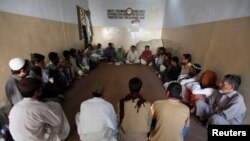As many as 6 million people in South Asia are infected with the virus that causes AIDS, and more than 60 percent of them are in India, the World Bank said.
High-risk behaviors, such as injection drug use and unprotected commercial sex are driving the epidemic, but responses to the problem have been ineffective, the organization says.
In India, the virus is spread mainly through sex workers, men having sex with men and other sexual partners, and migrant workers. Bangladesh and Pakistan are facing growing epidemics among injection drug users, but less so among sex workers.
Abdul Latif Shaikh, a former heroin addict diagnosed with HIV, hands out sterile syringes to addicts in Karachi, Pakistan, to try to stem the spread. He is among the roughly 10 percent of drug users who understand how the virus is spread.
Hidden places
People who inject drugs can be found in sewers, on greenbelts, under bridges and on footpaths — places that are the most dirty and hidden, Shaikh said. They take drugs there. They have no means to buy their own syringes and drugs, so they end up sharing needles, he said. That is how he got HIV.
According to the United Nations, out of an estimated 430,000 injection drug users in Pakistan, almost one-third are HIV-positive.
Out of a total population of 182 million, these numbers may seem negligible, but they have been doubling almost every two years. That's a worrying trend, said Cesar Guedes of the U.N. Office on Drugs and Crime in Islamabad.
"Pakistan is among the three top countries where there is a hyperconcentration of HIV/AIDS among injecting drug users. It is among the top three in Asia," Guedes said. "This is growing in a dangerous way, but of course we believe it is not too late for them to take note of this very difficult situation."
The other two Asian countries are Indonesia and the Philippines.
Pakistan has yet to take effective measures to counter its HIV problem. Guedes cited cultural reasons and a lack of understanding among the relevant bureaucracy as the reasons why the Pakistan government has been slow to effectively respond. And as injection drug users interact sexually with other communities, the disease is spreading.
When drug users "go back to their partners and spouses, and if they result in some cases to become sex workers to get more money for drugs and venture into unprotected sex, then they are exposing others who are not drug users," Guedes said.
Enormous stigma
Mussarat Jabeen, a counselor working with HIV-positive patients in Islamabad, said there is still an enormous stigma attached to the disease.
Some clients don't agree to get treatment and don't tell their spouses, she said. "That way, the illness silently spreads.
After injection drug users, the highest prevalence of HIV in Pakistan is among "hijra" or transgendered sex workers and male sex workers. There is also a growing trend of boys in college and universities selling sex to pay their tuition fees.












